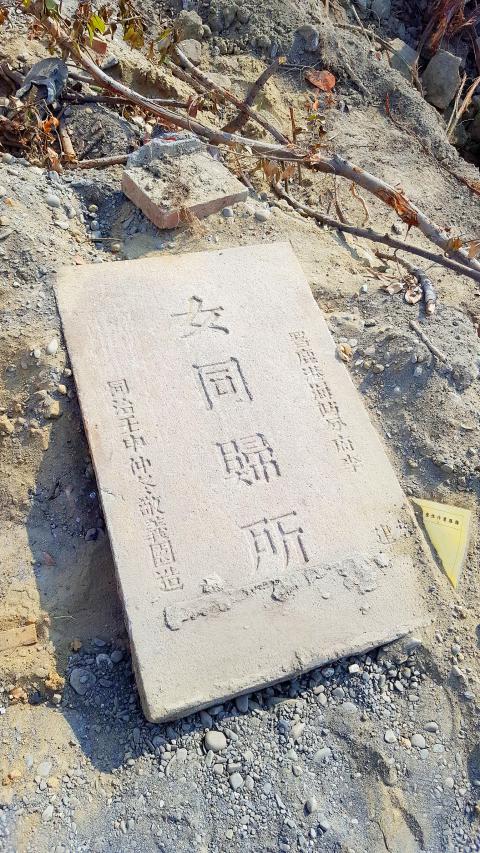A trove of Qing Dynasty headstones has been unearthed at a public cemetery in Changhua County’s Lugang Township (鹿港), shedding light on the township’s early history.
The discovery was made during renovation work at the cemetery.
Cultural Affairs Bureau Director Chen Wen-pin (陳文彬), who inspected the site on Tuesday last week, said he has called a halt to the renovation and would consult with experts to identify and preserve the headstones.

Photo courtesy of Chen Shi-hsien
The township office contacted the county government immediately after it was informed about the discovery, Lugang Secretary Lin Wei-jen (林威任) said.
Many of the headstones date to 1872, when Jingyi Yuan (敬義園), a charitable organization, built a public cemetery for unclaimed dead women in the township, Changhua Cultural Heritage Society honorary president Chen Shih-hsien (陳仕賢) said.
The Japanese colonial government in the 1930s relocated the unnamed graves and the headstones from the original site to the current location, which explains their discovery, he said.
Founded by local gentry in 1777, Jingyi Yuan was one of the oldest charitable organizations in Taiwan and the eight great merchant families of old Lukang had contributed to its work, Chen said.
In addition to unnamed graves, headstones belonging to local poets and other literary figures were also found, he said, adding that the headstones have historical value due to their excellent condition.
The county government should preserve the headstones and inscriptions of the township in a collection, especially as a local history museum is being planned for the Fusin Grain Warehouse, Chen said.

A preclearance service to facilitate entry for people traveling to select airports in Japan would be available from Thursday next week to Feb. 25 at Taiwan Taoyuan International Airport, Taoyuan International Airport Corp (TIAC) said on Tuesday. The service was first made available to Taiwanese travelers throughout the winter vacation of 2024 and during the Lunar New Year holiday. In addition to flights to the Japanese cities of Hakodate, Asahikawa, Akita, Sendai, Niigata, Okayama, Takamatsu, Kumamoto and Kagoshima, the service would be available to travelers to Kobe and Oita. The service can be accessed by passengers of 15 flight routes operated by

Chinese spouse and influencer Guan Guan’s (關關) residency permit has been revoked for repeatedly posting pro-China videos that threaten national security, the National Immigration Agency confirmed today. Guan Guan has said many controversial statements in her videos posted to Douyin (抖音), including “the red flag will soon be painted all over Taiwan” and “Taiwan is an inseparable part of China,” and expressing hope for expedited reunification. The agency last year received multiple reports alleging that Guan Guan had advocated for armed reunification. After verifying the reports, the agency last month issued a notice requiring her to appear and explain her actions. Guan

GIVE AND TAKE: Blood demand continues to rise each year, while fewer young donors are available due to the nation’s falling birthrate, a doctor said Blood donors can redeem points earned from donations to obtain limited edition Formosan black bear travel mugs, the Kaohsiung Blood Center said yesterday, as it announced a goal of stocking 20,000 units of blood prior to the Lunar New Year. The last month of the lunar year is National Blood Donation Month, when local centers seek to stockpile blood for use during the Lunar New Year holiday. The blood demand in southern Taiwan — including Tainan and Kaohsiung, as well as Chiayi, Pingtung, Penghu and Taitung counties — is about 2,000 units per day, the center said. The donation campaign aims to boost

The Central Weather Administration (CWA) said a magnitude 4.9 earthquake that struck off the coast of eastern Taiwan yesterday was an independent event and part of a stress-adjustment process. The earthquake occurred at 4:47pm, with its epicenter at sea about 45.4km south of Yilan County Hall at a depth of 5.9km, the CWA said. The quake's intensity, which gauges the actual effects of a temblor, was highest in several townships in Yilan and neighboring Hualien County, where it measured 4 on Taiwan's seven-tier intensity scale, the CWA said. Lin Po-yu (林柏佑), a division chief at the CWA's Seismological Center, told a news conference